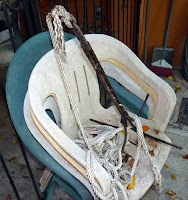Reason 259 why I should sell my house: yard work.
I have a service that mows my lawn and does some general weeding to keep the dandelions in check. But the rest of the gardening is left on its own.
My plan was to spend my few hours in Salem talking with friends -- sparring over philosophy or just finding out who was doing what. And I have done a bit of that.
But I have spent almost as much time getting the yard back into shape.
As you can see in the photograph at the top of the post, that parking strip lawn does not look very healthy. Nor should it. The irrigation system was turned off last winter and has not been providing any water since the rains stopped. As a result, the entire lawn is dead. I suppose I am being green by being brown.
My irrigation guy showed up yesterday to get the system up and running. It appeared to be fine when he left. And it came on at 4 this morning as scheduled -- and it was still running at 10 AM when I shut it off. Unless I want to star in one of those articles where citizens receive $2,000,000 water bills, this will not do.
In yesterday's post, you could see how the Boston Ivy on my chimney had run wild. I could not head to Bend tomorrow without ameliorating part of the problem. As nice as the ivy looks, it can destroy siding, windows and roofs. And it was attacking all three.
After spending five hours carefully stripping it off, I was able to fix most of the problem. The pieces that are obvious outliers were out of my reach on the ladder.
Once again, I have learned that age has played havoc with my balance. Getting near the top of the ladder was an exhilarating experience. But one I do not soon want to repeat.
That is how things must stay on this trip. I did not even have an opportunity to talk with my real estate agent. To, at least, initiate the first steps in being a former home owner in Oregon.
That will be for my next trip north. Probably dedicated for just that purpose.
By then, I will undoubtedly have discovered reason 260 to sell my house.
I have a service that mows my lawn and does some general weeding to keep the dandelions in check. But the rest of the gardening is left on its own.
My plan was to spend my few hours in Salem talking with friends -- sparring over philosophy or just finding out who was doing what. And I have done a bit of that.
But I have spent almost as much time getting the yard back into shape.
As you can see in the photograph at the top of the post, that parking strip lawn does not look very healthy. Nor should it. The irrigation system was turned off last winter and has not been providing any water since the rains stopped. As a result, the entire lawn is dead. I suppose I am being green by being brown.
My irrigation guy showed up yesterday to get the system up and running. It appeared to be fine when he left. And it came on at 4 this morning as scheduled -- and it was still running at 10 AM when I shut it off. Unless I want to star in one of those articles where citizens receive $2,000,000 water bills, this will not do.
In yesterday's post, you could see how the Boston Ivy on my chimney had run wild. I could not head to Bend tomorrow without ameliorating part of the problem. As nice as the ivy looks, it can destroy siding, windows and roofs. And it was attacking all three.
After spending five hours carefully stripping it off, I was able to fix most of the problem. The pieces that are obvious outliers were out of my reach on the ladder.
Once again, I have learned that age has played havoc with my balance. Getting near the top of the ladder was an exhilarating experience. But one I do not soon want to repeat.
That is how things must stay on this trip. I did not even have an opportunity to talk with my real estate agent. To, at least, initiate the first steps in being a former home owner in Oregon.
That will be for my next trip north. Probably dedicated for just that purpose.
By then, I will undoubtedly have discovered reason 260 to sell my house.







































